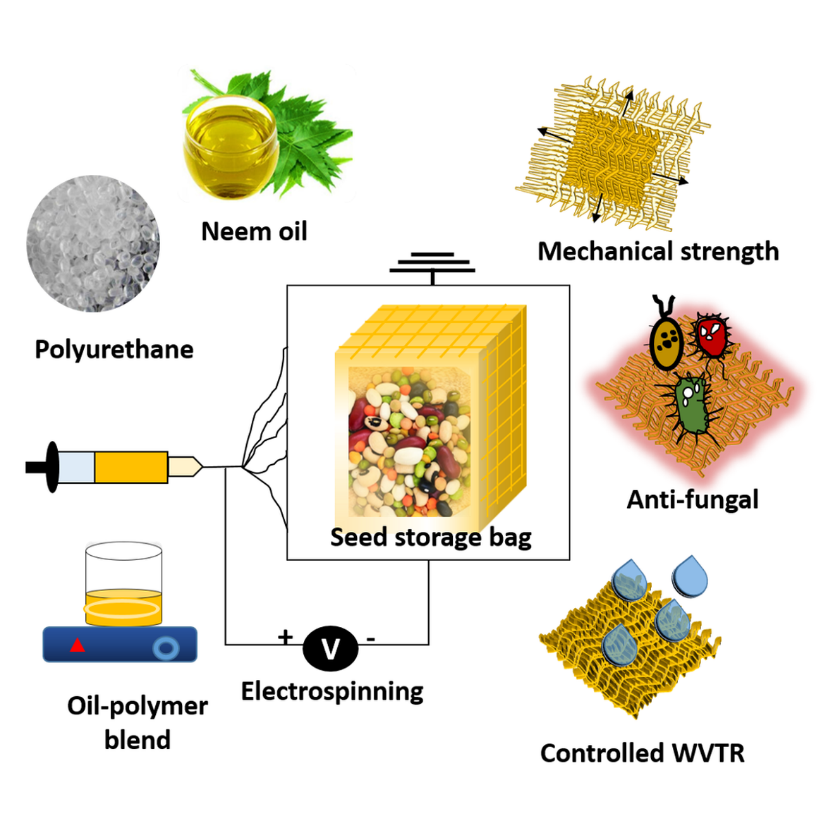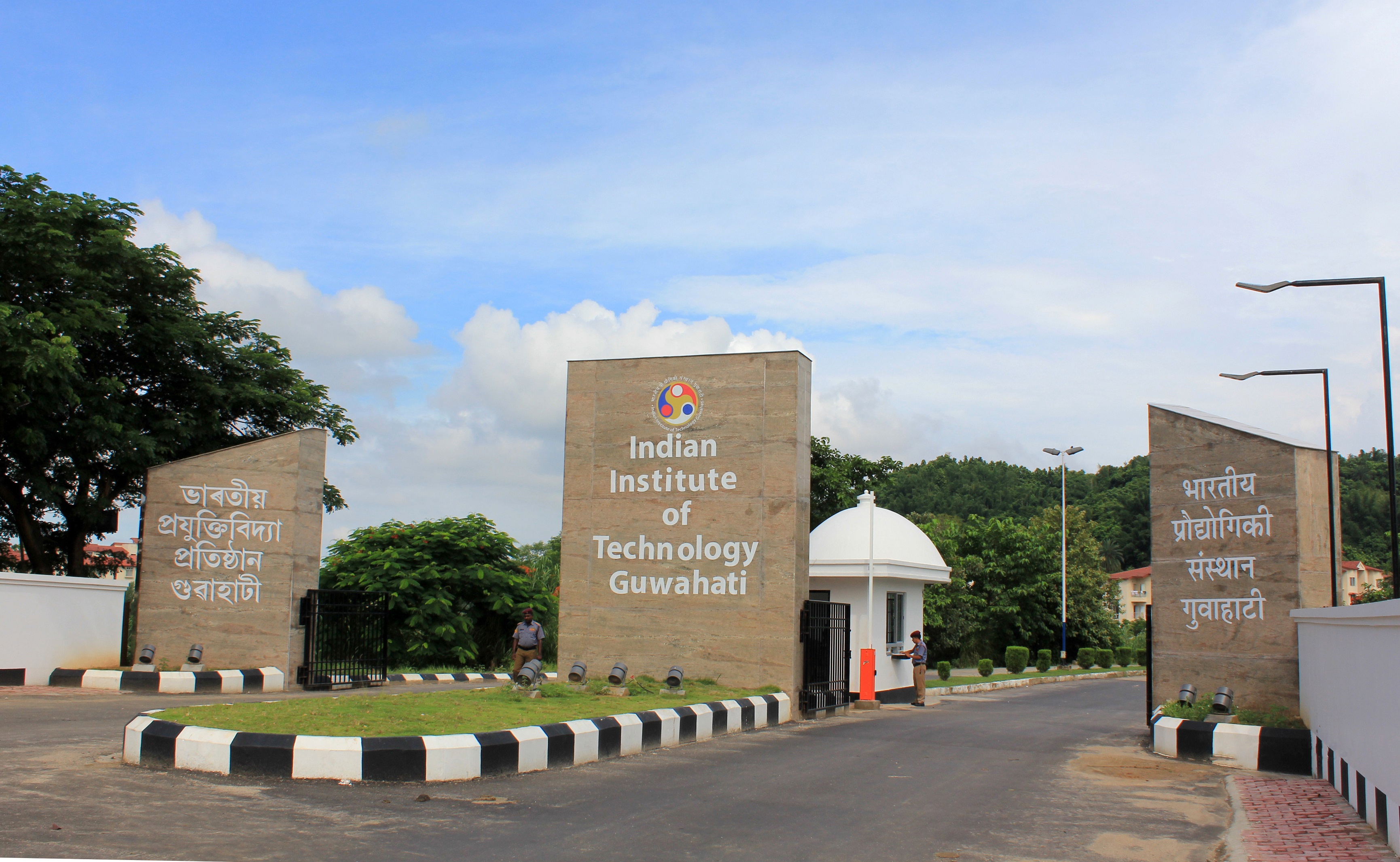A Step towards Sustainable Agriculture: It is first ever attempt to fabricate nanofibrous bags with the aim to reduce the post- harvest seed storage losses
 KRC TIMES Desk
KRC TIMES Desk

Indian Institute of Technology Hyderabad Researchers has developed a Neem Oil Encapsulated Electrospun Polyurethane Nanofibrous Bags for Seed Storage. The real time storage experiment carried out for 75 days infers that 90% seeds stored in nanofibrous bags were uninfected whereas 70% seeds in commercial bags found to be infected with storage fungi.
Post-harvesting, proper storage of seeds is necessary to preserve the active germplasm of crops for a longer period without compromising their viability and germination ability. There are numerous factors needed to be considered while storing the seeds either as a food source or as seeds for next season. The most important factors are a type of storage structure, temperature condition and moisture content which can provoke insects, rodents and fungal manifestation depending upon the nature of seeds. The indigenous seed storage practices utilize various kinds of structures to store the grains such as ropes and bamboo baskets, mud and earthen pots, wooden structures, brick structures, underground pits, gunny bags, polypropylene bags, etc.
Additionally, various natural pest control measures are practised by farmers such as dressing the seeds with oil or cow dung ash or wood ash and then spreading the leaves of peach, neem, turmeric, lemon, bakayan, walnut etc. In modern storage practices, chemical fumigants and insecticides such as Methyl Bromide, Phosphine, Phostoxins, Actellic Super etc. are used to control the microbial invasion.
Despite all these measures, there are significant seed storage losses wasting nearly 1.3 billion food grains every year across the world which can actually satisfy the food hunger of large population worldwide. These losses not only badly affect the farmer’s livelihood and imposes pressure on the search of other food resources but also affect the economy of any country. However, there has not been an as-desired focus on preventing post-harvest losses incurred by improper storage. The search for an effective and alternative storage system is, therefore, a need for an hour in controlling postharvest seed storage losses, especially in developing largely populated countries like India.
Current research is an attempt in this direction by demonstrating the suitability of Neem oil (NO) encapsulated electrospun Polyurethane (PU) nanofibrous bags as an ideal storage system. Polyurethane is the most favoured versatile polymer in current time and polyurethane nanofibers are found to be elastic, semipermeable, thermally stable and with excellent mechanical strength; hence they are used in protective textiles, air filters, wound dressing mats etc. On the other hand, Neem leaves or oil have been used since ages in various agricultural practices to control storage pests, repel insects, nitrification of soil, inhibit farm pests, kill insect larvae, control plant diseases and many more. Neem oil contains distinguished triterpenoids namely Nimbin and azadirachtin. Nimbin imparts anti-inflammatory, anti-mycotic and anti-microbial properties. Whereas, azadirachtin controls or inhibits the manifestation of insect pests by acting as an antifeedant and growth disruptor. Neem oil can control 200 different species of insects without harming the useful one. It is a biodegradable, non-toxic, environmentally useful bio-pesticide.
This is a first ever attempt to fabricate nanofibrous bags with the aim to reduce the post- harvest seed storage losses. In this work, the encapsulation of neem oil into the polyurethane nanofibers (PUNO) is achieved by electrospinning the homogenous blend of both the components in Di-methyl for. The real time testing of PUNO nanofibrous bags is also carried out by storing three different kinds of seeds for total of 75 days at normal room temperature conditions. The stored seeds were then incubated on Sabouraud Dextrose Agar to determine any microbial invasion.
The research was led by Dr. Chandra Shekhar Sharma, Associate Professor, Department of Chemical Engineering, IIT Hyderabad. This research has been partially funded by DST-INSPIRE faculty grant.
The Research Paper, co-authored with his PhD Student Mrunalini K. Gaydhane, & Sampada P. Pudkea from Creative & Advanced Research Based on Nanomaterials (CARBON) Laboratory, Department of Chemical Engineering, was published in the international peer-reviewed scientific journal The Journal of Applied Polymer Science.

Highlighting the need for developing alternate, biodegradable, non-toxic, environmentally useful bio-pesticide based Nanofibrous storage bags, Dr. Chandra Shekhar Sharma, Associate Professor, Department of Chemical Engineering, IIT Hyderabad, said, “The as-fabricated PUNO-10% mat possesses excellent load capacity and max. tensile strain values superior to the commercial polypropylene patterned sample. The real time applicability of PUNO-10% pouches infers that any type of seeds can be stored for a longer duration at normal room temperature conditions. The as stored seeds in nanofibrous pouches for 75 days have successfully inhibited the growth of storage borne fungi. Whereas, almost 70% seeds stored in commercial polypropylene pouches were infected with Aspergillus niger.”
“Large scale production of nanofibers, however, is still a challenge in which there is a promising development in recent years and that gives a hope for commercialization of such storage bags in near future ”added Dr. Sharma.




